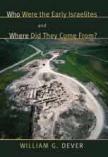The Emerging Confederation'
Perhaps no period in the history of ancient Israel is as controversial as the two centuries between the Exodus from Egypt and the establishment of kingship in the late 11th century B.C.E. under Saul and his successor David. Contemporary views run the gamut from essential acceptance of the biblical traditions to complete skepticism about them. The only mention of anything or anyone in the first eight books of the Bible that can be verified from a contemporaneous nonbiblical source is Israel itself, which occurs among a list of mostly Canaanite enemies that the Egyptian Pharaoh Merneptah claimed to have defeated toward the end of the 13th century. So there must have been an Israel, in the land of Canaan, by that time. But who were these Israelites, and how, and when, did they get there? These are the topics on which William Dever focuses in his latest book, a kind of prequel to his earlier What Did the Biblical Writers Know and When Did They Know It? (reviewed in America, 7/2/01).
The dominant biblical tradition tells of the exodus of the Israelites from Egypt, probably to be dated in the mid-13th century B.C.E. After this, according to the Book of Joshua, they invaded the land of Canaan from the east; and in a series of swift and inexorable military campaigns, they occupied all of it, exterminating the Canaanites who lived there. Until the latter part of the 20th century, most scholars, especially Americans and Israelis, accepted this account of the conquest of the Promised Land as essentially historical and as confirmed by archaeological discoveries.
In the last few decades, however, the majority of scholars have concluded that the account is not historically accurate. For one thing, there is new archaeological evidence, especially the appearance, beginning in the late 13th and early 12th centuries, of hundreds of agricultural villages in the central hill country of Palestine. These mostly unfortified settlements show some new cultural markers, but also considerable continuity with earlier Canaanite culture. For Dever, these highland villages are mostly proto-Israelite, although some of their distinctive traits are also found in Transjordan, in territory that the Israelites never controlled. It was from these villages that the early Israel slowly emerged as a confederation of disparate groupssome Canaanites, some nomads settling down and some, although Dever is less clear on this point, who had left Egypt. The principles that unified them, codified in the Ten Commandments, were exclusive worship of Yahweh, who had brought Israel out of Egypt, and mutual support. Only gradually, over the course of about two centuries, did the confederationwhich called itself Israel, as did the Pharaoh Merneptahgain control of the entire land of Canaan.
In addition to the most recent archaeological data, this complex synthesis is based on some biblical traditions, especially in the Book of Judges, which document that various Canaanite groups became part of Israel and that the process of conquest was gradual. The elaboration of the synthesis is the heart of Dever’s book, and it is masterfully done. Unfortunately, as in his earlier volume, he cannot resist engaging in attacks on those who hold different views or who use other approaches. In a typically revealing autobiographical aside, Dever reports that during a national scholarly meeting, he listened as biblical scholars explained why a history of ancient Israel could no longer be written:
Finally I could keep silent no longer. I rose to my feet and protested loudly...: If you biblical scholars are no longer able or willing to write the history of Israel, then we archeologists will do it.
This latest hybrid of polemics and accessible scholarship makes one wish that Dever had done what he promised. Few are as well equipped as he to write a history of ancient Israel that would integrate the various sources, both textualincluding not just the Bible but other relevant ancient writingsand artifactualthe archaeological record as it has been uncovered and interpreted for the last century and a half.
This is an important but flawed book. It lucidly presents the new data and offers a probable historical synthesis, but it is marred by a querulous tone and a surprising number of careless errors and inconsistencies. The definitive history of early Israel has yet to be written.
This article also appeared in print, under the headline “The Emerging Confederation',” in the June 9, 2003, issue.








